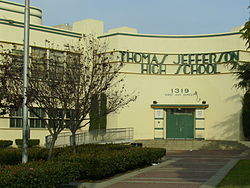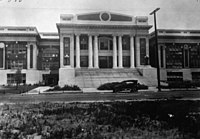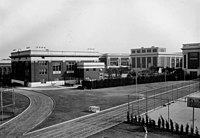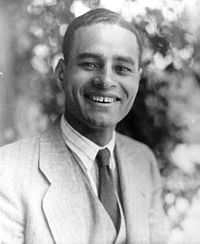Jefferson High School (Los Angeles)
| Thomas Jefferson High School | |
|---|---|
 | |
| Location | |
 | |
1319 East 41st Street Los Angeles, California 90011 | |
| Coordinates | 34°00′34″N 118°15′03″W / 34.00958°N 118.25093°W |
| Information | |
| Type | Public |
| Established | 1916 |
| School district | Los Angeles Unified School District |
| CEEB code | 051815 |
| Principal | Agustin Gonzalez |
| Teaching staff | 33.80 (FTE)[1] |
| Grades | 9–12 |
| Enrollment | 615 (2023-2024)[1] |
| Student to teacher ratio | 18.20[1] |
| Campus | Urban |
| Color(s) | Green and Gold |
| Athletics conference | Exposition League CIF Los Angeles City Section |
| Nickname | Democrats (Demos) |
| Rival | John C. Fremont High School |
| Yearbook | The Democrat |
| Website | https://jefferson-lausd-ca.schoolloop.com |
Thomas Jefferson High School, usually referred to as Jefferson High School, is a public high school in the Los Angeles Unified School District. Founded in 1916, it is the fourth oldest high school in the school district. Located in South Los Angeles, its surrounding communities are Downtown, Central-Alameda, Florence, Historic South-Central and South Park. Jefferson's school colors are kelly green and gold and the sports teams are called the Democrats, or Demos for short. In 2006, a pilot program called New Tech: Student Empowerment Academy began in the northeast portion of the school. New Tech has since become a separate charter school housed in the Jefferson building. In 2016 New Tech closed down and the available space is now used by Nava College Preparatory Academy a pilot school that was established in 2014.[2]
History
[edit]







In 1915, the citizens of Los Angeles voted to sell bonds to raise $4,600,000 to build schools in the Los Angeles area. Approximately $500,000 was appropriated to build Jefferson High School[3] on the "Stadium East Grounds" (The Old Coliseum)[a] which held approximately 25,000 people in a circled amphitheater configuration. The "Stadium," as it was known, was the site for hosting and entertaining travelers on the way to both the San Diego and San Francisco world expos in 1915. Numerous rodeos and bicycle races were held at the location.[4]
Architect Norman F. Marsh was hired to design the new Jefferson High School complex, the property front 1235 feet on Hooper Avenue, 1149 feet on Compton Avenue, and 952 feet on 34th Street and 392 feet on 38th street. The buildings of the group would be of brick and concrete construction, being faced with rug tapestry brick and trimmed with artificial stone. All corridors and stairways would be made absolutely fireproof. The classical style would be followed, each of the main structures having a dignified entrance portico with stone pediment and columns.[3]
Jefferson opened its doors on September 11, 1916, with 24 faculty members and two buildings completed. Theodore Fulton was installed as the school's first principal.[5]
On March 10, 1933, a magnitude 6.4 earthquake in the city of Long Beach completely destroyed the infrastructure of the six buildings which composed the Jefferson High School Campus. The campus was closed from March 10 until April 6 while the school board assessed the situation. On April 6, tent bungalows provided by the school board were erected on the football fields. Classes were shortened to half day sessions in order to serve the entire student population.[6]
Reconstruction
[edit]In 1933, Architect Stiles O. Clements was hired to build a 45-unit campus with a budget of $353,000.[7] The "Streamline Modern" building structures were completed in 1935. Ross Dickinson was selected and funded by Federal Art Project to paint four 11 feet by 5.5 foot murals with the theme "The History of Recorded Word". The murals were completed in 1937.[8]
As of 1936, several notable alumni such as Ralph Bunche, Woody Strode and Samuel R. Browne had graduated from Jefferson High School. All three men were African American, the first of many Jefferson alumni to break racial barriers in the politics of diplomacy, the art of dance, the art of music and the interpretation of sports. Jefferson produced more jazz musicians and composers than any other high school west of the Mississippi.[9] Many of the musicians were nurtured under the guidance of Samuel R. Browne.
Post-reconstruction
[edit]It was in the Los Angeles City High School District until 1961, when it merged into LAUSD.[10]
Athletics
[edit]In 1937, Jefferson won the first of eight California State Championships in track and field (1937, 1949, 1950, 1951, 1952, 1956, 1962, and 1964).[11] The four consecutive state championships in California (1949, 1950, 1951 and 1952) have not been surpassed today. Woody Strode is one of two men who broke the color barrier in the National Football League in 1946. Mal Whitfield and Charles Dumas both received gold medals in the Olympics. This is a rare instance when two Olympic Gold medalists have come from the same high school.
Music
[edit]Jefferson High has produced more prominent jazz musicians and composers than any other public or private high school in California.[9] The school's music classes greatly impacted the participation of teenagers and young musicians in the Central Avenue jazz scene, its curriculum offering courses in music theory, music appreciation, harmony, counterpoint, orchestra, band, and choir. The hiring of influential teacher Samuel Browne in 1936 marked the beginning of a shift toward an integrated faculty in LA County public secondary schools and a pedagogical approach that emphasized mentorship, encouragement, and involvement with students and their families.[12]
Academic configuration
[edit]Jefferson is a traditional calendar school, composed of four Small Learning Communities (SLCs) and the Early College program which is located at L.A. Trade Tech. The goal of each SLC is to offer individualized attention to students.[13] The SLCs are as follows:
- Academy of Business & Communication (ABC): focuses on building leaders in the liberal arts, retail, medical, legal and business fields.
- Creative Arts and Expression (CAE): focuses on the creative energy and leadership within each student through the arts.
- Global Outlook through Academic Leadership: focuses on building leaders in the social, political, environmental, health and economic fields
- TPA Small Learning Community: focuses on building leaders in the education and social services fields
The Early College Program (Jefferson/Trade Tech. Incentive) accepts students, based on recommendation and interview, who have "extenuating circumstances" requiring special support to achieve college acceptance.
Notable alumni
[edit]This article's list of alumni may not follow Wikipedia's verifiability policy. (October 2021) |
Dancers and choreographers
[edit]- Alvin Ailey – choreographer and activist; founded the Alvin Ailey American Dance Theater in New York City.[13]
- Carmen De Lavallade – dancer and actor[14]
Television and film actors
[edit]- Theresa Harris – African American character actress and singer, notable early films include Hold Your Man (1932) starring Jean Harlow and Clark Gable, Baby Face (1933) starring Barbara Stanwyck, and Professional Sweetheart (1933) starring Ginger Rogers
- Woody Strode – African American actor and football player, acted in films including The Ten Commandments, Spartacus, and Posse
- Juanita Moore – actress, fourth African American nominated for an Oscar. Participated in over 50 movies; best known for her role as the mother in the movie Imitation of Life[15]
- Suzette Harbin – African American actress and dancer in films
- Roland Got – Chinese American actor, best known for The Good Earth (1937)
- Matthew Beard Jr. – African American actor, best known as Stymie in Our Gang (The Little Rascals) shorts
Television and film production and design
[edit]- Iwao Takamoto – animator and character designer for Walt Disney Productions and Hanna-Barbera
- John Meehan – art director and production designer
Politicians and judges
[edit]- Ralph Bunche – Educator, UN mediator on Palestine and Nobel Peace Prize Winner[16]
- Thelton Henderson – federal judge in the Northern District of California.[17]
- Willard H. Murray, Jr. – California State Assembly Member 1988–1996 (District 52); California Institute for the Preservation of Jazz. Current director of the Water Replenishment District 1. Father of Former State Senator Kevin Murray ref: Testimony of Buddy Collette & Marl Young[18]
- Augustus F. Hawkins – U.S. House of Representatives from California's 21st and 29th district from 1963 to 1991; California assembly from 1935 to 1963[19]
- David W. Williams – Judge for the United States District Court for the Central District of California; first African American Federal Judge from states west of the Mississippi.[20]
- William R. Clay – Appointed by Governor Jerry Brown to Superior Court judge in October 1976[21]
- Earl C. Gay – Los Angeles City Council member, 1933–45
- Mablean Ephriam – prosecuting attorney on television series Divorce Court and Justice with Judge Mablean[22]
Journalists
[edit]- Stanley Crouch – syndicated columnist and novelist best known for his jazz criticism and his 2004 novel Don't the Moon Look Lonesome?[23]
Composers, songwriters, and music directors
[edit]- Roy Ayers – American funk, soul, and jazz composer, vibraphone player, and record producer. [24] Nicknamed the "Godfather of Neo-Soul."
- Richard Berry – singer-songwriter, original performer of the rock standard "Louie Louie"[25]
- Rickey Minor – Emmy-nominated music director, composer, and music producer for shows including The Tonight Show with Jay Leno, American Idol and Don't Forget The Lyrics!
- Barry White – record producer, singer-songwriter; five-time Grammy Award winner. White attended Jefferson for sophomore and junior year.
- Horace Tapscott – Jazz Piano player and composer[26] Subject of UCLA Jazz Archive called the Horace Tapscott Collection. Creator of "The Pan Afrikan Peoples Arkestra (P.A.P.A.)".
- Jesse Belvin – Songwriter, Singer –[27] Co-Wrote "Goodnight My Love" used to end Alan Freed Show; co-credited as one of writers of "Earth Angel" made popular by The Penguins.
- Johnny "Guitar" Watson – blues and funk singer-songwriter and guitarist[28]
- Young Jessie – R&B and jazz singer-songwriter[29]
Instrumental musicians
[edit]- Dexter Gordon – jazz saxophonist known for his music and Starring role in the movie Round Midnight[30]
- Sonny Criss – jazz saxophone player[31] – transferred from Jordan High School to Jefferson
- Addison Farmer – jazz bassist[30]
- Frank Morgan – jazz saxophone player[32]
- Chico Hamilton – jazz drummer[30]
- Lee Young – jazz drummer[30]
- Jack McVea – jazz and Dixieland saxophone player[30]
- Art Farmer – jazz trumpet player[30]
- Bill Douglass – jazz drummer[30]
- Ernie Royal – jazz trumpet player[30]
- Marshal Royal – jazz saxophone player[33]
- Lammar Wright, Jr. – jazz trumpet player[30]
- Vi Redd – jazz saxophone player[30]
- Jackie Kelson – jazz saxophone player[30]
- Ginger Smock – concert and jazz violinist[33]
- Don Cherry – jazz trumpet player[33]
- Melba Liston – jazz trombone player[33] – attended Jefferson, but later transferred to Polytechnic High School
- Ed Thigpen – jazz drummer[24][34]
- Big Jay McNeely – jazz saxophone player[31] – transferred from Jordan to Jefferson
Singers
[edit]- Curtis Williams and Bruce Tate – members of doo-wop group The Penguins[35]
- Gaynel Hodge, Alex Hodge, and Cornell Gunter – members of musical group The Platters[36]
- Ray Brewster – member of the groups The Hollywood Flames, The Cadillacs, The Penguins[35] and The Platters[37]
- Johnnie Martin – member of the gospel group Mighty Clouds of Joy[37]
- Etta James – blues singer famous for hit song "At Last"
- Ernie Andrews – jazz and blues singer[24]
- Merry Clayton – solo musician and backup singer for many artists, including Mick Jagger
- O.C. Smith – jazz singer and minister who performed with Count Basie Orchestra; he recorded the first version of the song ""That's Life" (song)" made famous by Frank Sinatra. He had numerous hit songs in his long career.[38]
- Mel Walker – lead singer with the Johnny Otis Orchestra[39]
- Cornell Gunter – R&B singer and member of The Platters and The Coasters. Transferred to Manual Arts his senior year.[40]
- Jennell Hawkins – R&B and jazz singer[41]
- Ivie Anderson – jazz singer, performed with Duke Ellington's orchestra between 1931 and 1942
- Richard Berry – singer, songwriter, and musician. Most famous for writing Louie Louie, Berry performed with numerous Los Angeles doo-wop groups including The Flairs. Joseph (Virgil) Johns1960s the Marathons 1983 Barry White's Westwing * Floyd Dixon
Military
[edit]- Theodore Lumpkin Jr. (1919 - 2020) – Tuskegee airman, social worker and businessman[42]
Visual Artists
[edit]- Kerry James Marshall – American artist[43]
Sports
[edit]- Emmett Ashford – first African-American umpire in major league baseball
- Andy Bakjian – National Track and Field Hall of Fame official. Bakjian was a longtime coach at Jefferson.
- Don Bishop – football player for the Dallas Cowboys, Pittsburgh Steelers, and Chicago Bears
- Otis Burrell – 5 time National Champion in the high jump, 1966 NCAA Champion at University of Nevada, Reno, Pan American Games silver medalist.
- Milt Davis – football player for the Baltimore Colts from 1957 to 1961, including winning the 1958 NFL Championship game
- Romeo Doubs – football player for the Green Bay Packers
- Charles Dumas – Olympic high jumper and the first person to clear seven feet. Attended Jefferson in his sophomore and Junior years; transferred to Centennial High School in Compton.
- Joe Kelly – football player for the Cincinnati Bengals
- Edgar Lacey – UCLA basketball player[44]
- Lee Maye – Major League Baseball player[45]
- Glenn McDonald – basketball player for the Boston Celtics[46]
- Bill McGill – NBA basketball player[47]
- Bernard Quarles – NFL and CFL football player[48]
- Woody Strode – NFL and CFL football player and decathlete who went on to become an actor[49]
- Mal Whitfield – Middle-distance runner and Olympic gold medalist[50]
Academic Performance Index (API)
[edit]API for High Schools in the LAUSD District 5 and local small public charter high schools in the East Los Angeles region.
| School | 2007 [51] | 2008 [52] | 2009 [53] | 2010 [54] | 2011 [55] | 2012 | 2013 [56] |
|---|---|---|---|---|---|---|---|
| Francisco Bravo Medical Magnet High School | 807 | 818 | 815 | 820 | 832 | 842 | 847 |
| Marc and Eva Stern Math and Science School | 718 | 792 | 788 | 788 | 809 | 785 | 775 |
| Oscar De La Hoya Animo Charter High School | 662 | 726 | 709 | 710 | 744 | 744 | 738 |
| James A. Garfield High School | 553 | 597 | 593 | 632 | 705 | 710 | 714 |
| Abraham Lincoln High School | 594 | 609 | 588 | 616 | 643 | 761 | 738 |
| Woodrow Wilson High School | 582 | 585 | 600 | 615 | 636 | ||
| Theodore Roosevelt High School | 557 | 551 | 576 | 608 | 793 | 788 | |
| Thomas Jefferson High School | 457 | 516 | 514 | 546 | 546 | ||
| Santee Education Complex | 502 | 521 | 552 | 565 | 612 | 636 |
Notes
[edit]- ^ The Old Coliseum precedes the "Los Angeles Coliseum built in 1929 that hosted two Olympics. It was the main amphitheater in Los Angeles in the late 1800s.
See also
[edit]- "Sisters at Heart", a 1970 episode of the TV series Bewitched that was written by students at Jefferson High School after having visited the set of that show and interacted with the cast and writers.
References
[edit]- ^ a b c "Thomas Jefferson Senior High". National Center for Education Statistics. Retrieved December 28, 2024.
- ^ Clark, Krista. "Student Empowerment Academy". New Tech Network. Retrieved 2015-12-26.
- ^ a b Jefferson "High" to cost Quarter-Million – Los Angeles Times – July 4th, 1915
- ^ Golden West as Pageant – Los Angeles Times – April 2nd, 1915
- ^ New High School faculty Name – Los Angeles Times – September 2nd, 1916
- ^ Last schools to reopen – Los Angeles Times – April 4th, 1933
- ^ Plans to be Prepared for Building Project – Los Angeles Times – September 30th, 1934
- ^ School Mural Depicts Writing, Graving, Printing – Los Angeles Times – May 16th 1937
- ^ a b Jazz High by Kirk Silsbee – LACityBeat Magazine[permanent dead link]
- ^ "Los Angeles City School District". Los Angeles Unified School District. Archived from the original on 1998-02-07. Retrieved 2020-10-27.
- ^ Top Track teams of all times Archived 2011-09-29 at the Wayback Machine
- ^ ISOARDI, STEVEN L.; MIRANDA, ROBERTO (2006). The Dark Tree: Jazz and the Community Arts in Los Angeles (1 ed.). University of California Press. ISBN 978-0-520-24591-4. JSTOR 10.1525/j.ctt1pnrgb.
- ^ a b Thomas Jefferson H.S. Alumni
- ^ Esteli Jacinto, Irlanda. "Carmen de Lavallade" (PDF). Dance Heritage Coalition. Retrieved 26 December 2015.
- ^ Mapp, Edward (2008). African Americans and the Oscar: decades of struggle and achievement. Lanham Maryland: Scarecrow Press. ISBN 978-0-8108-6106-0. pp. 13.
- ^ Nobel Prize Biography
- ^ Federal Judge Northern District of California
- ^ Testimony of Buddy Collette & Marl Young Archived 2008-11-23 at the Wayback Machine
- ^ Black Americans in Congress Archived 2010-08-04 at the Wayback Machine
- ^ Woo, Elaine, "David Williams Dies." Los Angeles Times, May 10, 2000. https://www.latimes.com/archives/la-xpm-2000-may-10-me-28552-story.html
- ^ Retired Judge, LAPD Veteran William R. Clay Dead at 85
- ^ "Judge Mablean Ephriam". Archived from the original on 2016-02-13.
- ^ Crouch, Stanley (2006). Considering Genius: Writings on Jazz. New York: Perseus Book Group. ISBN 0-465-01517-4. pp. Prologue.
- ^ a b c Bird, Christiane (2001). The DA CAPO JAZZ AND BLUES LOVER'S GUIDE TO THE U.S.. Cambridge MA: Da Capo Press. ISBN 0-306-81034-4. pp. 407.
- ^ Louie Louie Archived 2011-10-01 at the Wayback Machine
- ^ Tapscott, Horrace; Isoardi, Steve (2001). Songs of the Unsung: the musical and social journey of Horace Tapscott. North Carolina: Duke University Press. ISBN 0-8223-2531-4. pp. 28.
- ^ Guralnick, Peter (2005). Dream boogie; the triumph of Sam Cooke. New York: Time Warner Book Group. ISBN 0-316-37794-5. pp. 185.
- ^ year=1974, Blues unlimited, Issues 107–138 Magazine
- ^ Guralnick, Peter (2005). Dream boogie; the triumph of Sam Cooke. New York: Time Warner Book Group. ISBN 0-316-37794-5. pp. 252.
- ^ a b c d e f g h i j k Britt, Stan (1989). Dextor Gordon: a music biography. London: Da Capo Press. ISBN 0-306-80361-5. pp. 4, 26.
- ^ a b Porter, Roy (1991). There and Back. Oxford: Bayoo Press. ISBN 1-871478-30-8. pp. 162.
- ^ Stokes, W.Royal (1991). The Jazz Scene:an informal history from New Orleans to 1990. New York: Oxford University Press. ISBN 0-19-508270-2. pp. 125.
- ^ a b c d Bryant, Clora (1998). Central Avenue Sounds: Jazz in Los Angeles. Berkeley: University of California Press. ISBN 0-520-22098-6. pp. 28, 198, 206, 211, 257.
- ^ EdThipen.com Archived 2008-12-06 at the Wayback Machine
- ^ a b Marv Golberg R&B Notebook The Penguins
- ^ Marv Golberg R&B Notebook The Platters
- ^ a b Uncloudy Days:The Gospel Music Encyclopedia ISBN 0879308419
- ^ Rev. Dr O.C. Smith Bio[permanent dead link]
- ^ Deffaa, Chip (2000). Blue Rhythms: Six Lives in Rhythm and Blues. New York: Da Capo Press. ISBN 0-316-37794-5. pp. 159.
- ^ The Coasters Website
- ^ Answer.com
- ^ Araújo, Keka (10 January 2021). "Esteemed Tuskegee Airmen Theodore Lumpkin Dies From COVID-19". Black Enterprise. Retrieved 10 January 2021.
- ^ Alteveer, Ian (2016). Molesworth, Helen (ed.). Kerry James Marshall: Mastry. New York: Skira Rizzoli. p. 22. ISBN 978-0-8478-48331.
- ^ Funeral in Downey today for UCLA player, California Mr. Basketball 1963 Edgar Lacey Archived 2012-03-09 at the Wayback Machine, Long Beach Press Telegram, April 8, 2011
- ^ The Rare Double-Play of Arthure Lee Maye by Phil Milstein
- ^ Basketball
- ^ "Bill McGill Stats".
- ^ UCLA's Rasshan Set to Make History Saturday
- ^ Modern NFL 1946 – Forward
- ^ The Whitfield Foundation Archived 2011-10-04 at the Wayback Machine
- ^ 2006-07 Accountability Progress Reporting (APR) Archived 2017-10-08 at the Wayback Machine Retrieved on September 25, 2009
- ^ 2007-08 Accountability Progress Reporting (APR) Archived 2016-03-03 at the Wayback Machine Retrieved on September 25, 2009
- ^ 2008-09 Accountability Progress Reporting (APR) Archived 2017-02-18 at the Wayback Machine Retrieved on September 8, 2012
- ^ 2009-10 Accountability Progress Reporting (APR) Archived 2016-03-04 at the Wayback Machine Retrieved on September 8, 2012
- ^ 2010-11 Accountability Progress Reporting (APR) Archived 2016-03-04 at the Wayback Machine Retrieved on September 8, 2012
- ^ 2012-13 Accountability Progress Reporting (APR)[permanent dead link] Retrieved on February 27, 2017
External links
[edit]- Public high schools in Los Angeles
- Los Angeles Unified School District schools
- South Los Angeles
- 1916 establishments in California
- Educational institutions established in 1916
- Neoclassical architecture in California
- Morgan, Walls & Clements buildings
- Streamline Moderne architecture in California
- Jefferson High School (Los Angeles) alumni
